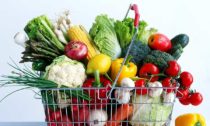
There is a multitude of people who are deciding to go meatless nowadays, so why is it that so many vegetarians are overweight and lack nutrition?
This is because many vegetarians are unsure what to snack on, so they latch onto pretzels, chips, and other high carb snacks.
Also, when choosing to go meatless, you really cut back on your body’s supply of nutrients that are vital to good health; including: calcium, protein, iron, zinc, vitamin D and B12.
Top 10 Foods for Vegetarians
Here are the top 10 foods every vegetarian should choose as they are loaded with nutrition, making them a perfect choice for a healthy diet!
- Dried Fruit: Besides making one of the best snacks around, they are terrific sources of iron, something most vegetarians lack. You can also add dried fruit to sweet potatoes, salads, vegetable dishes, as well as mix them in cookies, oatmeal, and cereal.
- Lentils: These old-fashioned legumes are not as popular as they once were, but they are terrific sources of protein, as well as fiber. Beans are more popular; however, lentils have, on average, about twice the protein of beans. You can add lentils to casseroles and stews, as well as sprinkle them over salads.
- Tofu: This plain looking food is so packed with nutrition, it’s a wonder people don’t eat more of it! Loaded with iron, zinc, calcium, some omega-3 fatty acids, as well as calcium and vitamin D! Tofu can be substituted for almost any meat in any recipe.
- Nuts: Nuts are another snack that you can use to add some flavor and crunch to almost anything! Brazil nuts, pecans, cashews, almonds, and walnuts are all rich in calcium, vitamin E, zinc, and the important omega-3 fatty acids. Put nuts into muffins, cookies, salads, cereals, even put some in your soup for an exciting change.
- Beans: Many vegetarians rely on these versatile protein packed vegetables, but to get a complete protein, you should combine beans with some whole grains, such as pasta or rice. Experiment with different types of beans so you don’t become bored.
- Seaweed: While this food from the sea is not very popular in the US, it is commonly consumed in almost every other part of the world. Seaweed, such as agar, alaria, nori, and dulse, are great sources of vitamin A, C, E, and most B vitamins, as well as calcium, iodine, iron and magnesium. It’s hard to find food that has this much going for it! Try nori sheets as “wraps” for veggies sandwiches or toast some kelp and add them to soups. It might take a few tries with different types of seaweed and recipes to find one you really enjoy, but we bet you end up loving this unusual sea vegetable!
- Leafy Greens: We all know the health benefits of leafy greens such as broccoli, Swiss Chard, collard greens and spinach, but did you know that these vegetables also have cancer-fighting antioxidants, as well as being high in iron, vitamin A, and folic acid? Sprinkle these with a bit of lemon juice to make the calcium they contain be more available to the body.
- Whole Grains: You can easily win that B12 battle by eating whole grain cereals that come fortified with B12. If you eat eggs or dairy, then you should get enough B12 from those sources, but if you don’t, be sure to add whole grains to your diet which not only contain this priceless B vitamin but also have fiber and zinc.
- Healthy Fats: Fat not only provides your body with these essential fatty acids, but it helps the body absorb certain vitamins and minerals. Focus on eating avocados, nuts, real butter, and olive oil.
- Iodine: For a healthy metabolism, the body needs iodine. Unfortunately, vegetarian diets are typically low in this much-needed mineral. You can improve this by choosing salt, which contains iodine or eating seaweed.
Bonus: Health Benefits From Onion And Garlic
Vegetarians need to take extra care in selecting their choices of nutritional sources. Consumption of garlic and onion is especially important for vegetarians. Garlic and onion seem like healthy foods, but what exactly are the health benefits from onion and garlic?
Take a look at New York Times’ best-selling book, The Perricone Promise. The author, Dr. Nicholas Perricone, says that garlic and onion are the world’s number two superfood, second only to the Açai berry, the nature’s amazing fruit from the Amazon. Garlic and onion belong to the Allium family which also includes leeks, scallions, shallots and chives. Let’s examine the health benefits from onion and garlic below.
What are the health benefits of Garlic?
The health benefits of Garlic include:
- lowering total cholesterol while raising the HDL or good cholesterol
- lessening the risk of atherosclerosis (the hardening of arteries)
- lowering blood pressure
- reducing the risk of blood clots which cause the majority of strokes and heart attack
- destroying infection causing viruses and bacteria
- reducing the risk of certain cancers particularly stomach cancer
- producing more natural killer cells in the blood to fight tumors and infections
- helping fight against neurological diseases such as Alzheimer’s
- enhancing detoxification by reducing toxins.
What are the health benefits of onions?
Onions are also very healthy with the following health benefits:
- inhibiting the growth of cancerous cells
- increasing HDL cholesterol, especially raw onions while reducing total cholesterol levels
- increasing blood clot dissolving activity
- helping prevent colds
- stimulating the immune system
- lowering blood sugar levels in diabetes
- having antibacterial and antifungal properties
- reducing the risk of certain cancers
- helping relieve stomach upset and other gastrointestinal disorders